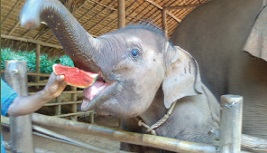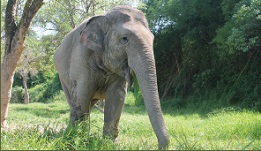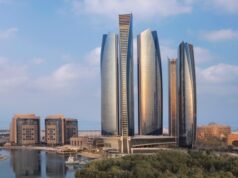Name: John Roberts
Title: Director of Elephants & Conservation Activities
Organization: Anantara Hotels, Resorts & Spas & Golden Triangle Asian Elephant Foundation
Years with organization: 13
Primary responsibilities: Most of Roberts’ responsibility is split several ways—managing the Foundation, working directly with the hotels to help them through their Green Growth 2050 sustainability certification, and working with the Minor International Sustainability Team on local and global policies to ensure what they do in Anantara is aligned with the vision of the board.
Organization’s most significant sustainability-related accomplishment: Roberts says, “I think our greatest sustainability related accomplishment (which also has welfare implications, by the way) so far is the discovery that purchasing elephants (even to rescue them) inevitably leads to elephants being caught from the wild. We discovered this the hard way through the first elephant we ‘rescued’, Tawan. His owner came back to us a year later with two more baby elephants and said, “Rescue these from me too.”
Organization’s most significant sustainability-related challenge moving forward: Roberts adds, “The biggest sustainability related challenge I think we face is containing the rhetoric from those who are coming to believe (myself included by the way) that the time for elephants to be meeting with humans in captivity should come to an end. At the moment a lot of this rhetoric is being focused at the tourism industry in a misguided attempt to enforce a total stop on captive elephants.”

CHIANG RAI, THAILAND—John Roberts may be the only person on the planet to work for a resort company and have the word “elephant” in his title. When your company has resorts in areas where elephants either roam free in the wild or captive in city streets, it is easier to understand the need for a Director of Elephants & Conservation Activities. For Anantara Hotels, Resorts & Spas, having someone dedicated to elephant protection aligns with its goal of creating luxury travel experiences that also benefit the local communities where each hotel and resort are located. Anantara Hotels, Resorts & Spas is a brand of Minor International. Minor International is the largest single donor of the Golden Triangle Asian Elephant Foundation.
Roberts has long had an interest in elephants, having seen his first one in the wild in 1999 in Nepal. Since that time he has come to understand the highly complex state of the elephant in Asia—there are more than 4,000 non-wild elephants in Thailand, for example—and how many mahouts (a person who works with, rides, and tends an elephant) rely on them to generate income for their families.
For this article, Green Lodging News interviewed Roberts by e-mail. The following are our questions and his answers.
How long have you been Director of Elephants & Conservation Activities for Anantara Resorts & Golden Triangle Asian Elephant Foundation?
It all came about quite organically in 2003. Anantara invited me to come and help them set up an elephant camp on the forest and grassland that they had inherited when they bought what is now Anantara Golden Triangle. At that stage they were of course looking at looking after elephants well but we were not thinking much beyond that. By 2006 we knew that we could provide for elephants’ needs and through our Bangkok Head Office, coupled with contacts I had then made with the government, we realized there was more we could do—in those days if you sat for two hours in certain spots in Bangkok you were certain to be hassled by at least one mahout begging with his elephant.
So we set up the Golden Triangle Asian Elephant Foundation to help these elephants as well as restructuring the business side of what we did to try to prevent other mahouts being tempted to take their elephants to the streets. Up until that point we had been working with Government elephants, who had a guaranteed good livelihood, and so we changed our sourcing mechanism to bring elephants direct from the local communities.
By that time I was already Director of Elephants. As some of you may know Anantara 13 years ago was a very small Asian brand of literally two hotels. Even by 2006, 2007 we probably had a footprint in Thailand and Maldives only, however beyond that point the brand started to grow exponentially and is still doing so today. As the brand grew they agreed to give me a more global role to help engender the mindset of sustainability and conservation that we had been able to put into the two hotels across the footprint.
What do you consider to be your primary responsibilities for the organization? What is your typical day like, if there is such a thing?
Now we have a great management team in the elephant camp; biologists and scientists, vets as well as experienced mahouts. My day-to-day job is less hands-on with the big grey beasts—though when I’m on site I still meet the team for coffee at six and interfere with their plans for the day!
 Most of my responsibility, however, is split two ways—firstly managing the Foundation (even though Anantara pays my full wage) and particularly the off-site projects which, now that tourism has picked up again and street begging is largely a thing of the past, are our main focus.
Most of my responsibility, however, is split two ways—firstly managing the Foundation (even though Anantara pays my full wage) and particularly the off-site projects which, now that tourism has picked up again and street begging is largely a thing of the past, are our main focus.
We fund wild elephant projects in three Thai national parks through separate on-the-ground partners, have our own 18,000 hectare forest in Cambodia and I’m beginning to work more and more closely with our sister foundation Land & Life in Kenya and Tanzania. We also have slush funds to move vets around South East Asia to emergency cases or just to share knowledge and experience and, in this age of social media, add one another on Facebook. I have found this is amazingly powerful in ensuring that elephant vets across the region are constantly in touch.
We fund and run workshops—most notably our Target Training Positive Reinforcement project that has focused on giving traditional trainers the power to use positive reinforcement techniques scientifically. To date we have seen five major camps across four South East Asian countries—including some government—adopt these techniques and traditional trainers build them in to everyday life. Our next workshop will be in Myanmar in October, the second one we have held there.
To help prevent street begging, not only do we employ elephants from the traditional community, we now have two English teachers in their schools, working on stationing a vet there full time and have plans to implement mahout healthcare. The more I work the more I am convinced that if we are to help captive elephants in the long run we need to help provide them happy, healthy, well-educated mahouts.
All these projects are designed from our desire to help as many elephants as possible, not just the ones we have on-site.
The second half of my job is the more global Anantara—and Minor Hotel Group—one either working directly with the hotels to help them through their Green Growth 2050 sustainability certification or with the Minor International Sustainability Team on local and global policies to ensure what we do in Anantara is aligned with the vision of the board. Also to help them gather the conservation-based information for initiatives such as GRI, DJSI and CDP.
Aside from the elephants we have comprehensive marine programs in southern Thailand, our Holistic Approach to Reef Protection with partners Coral Reef CPR in the Maldives and patrol and oversee a 19,000 hectare Marine Park in Mozambique. We are working on a mangrove-to-reef project in Sri Lanka, too. Our East African partners Elewana do great work through Land & Life in Kenya and Tanzania.
While, of course, I have a very small role to play when it comes to all of these great projects a lot of coordination comes through my computer as nominal boss of Anantara’s matched Dollars for Deeds program and I have a passionate interest in all of them.
As it relates to elephants, what do you consider to be Anantara Resorts & Golden Triangle Asian Elephant Foundation’s most significant sustainability-related accomplishment so far?
I think our greatest sustainability related accomplishment (which also has welfare implications, by the way) so far is the discovery that purchasing elephants (even to rescue them) inevitably leads to elephants being caught from the wild. We discovered this the hard way through the first elephant we ‘rescued’, Tawan. His owner came back to us a year later with two more baby elephants and said, “rescue these from me too.”
We did a bit of research, applied a bit of common sense, and worked out that the mahouts weren’t begging on the streets because they enjoyed doing so. They were there because they were mahouts—heirs to a 4,000 year tradition—and were begging because they had no work with which to support themselves and their families (or their elephants) and saw this as the only way to continue their culture of keeping elephants.
We changed our approach and focused on rescuing the mahout instead, as well as his family, which keeps the mahout and elephant together and ensures that no new elephant has to undergo training (the welfare bit). It also ensures that no new elephant has to be taken from the forest (the sustainability bit).
I call this a sustainability related accomplishment because elephants (who are endangered in the wild) are the architects and gardeners of Asia’s forests. An Asian forest without elephants is an unhealthy ecosystem and therefore unable to provide the full range of biological services we as, increasingly destructive, human beings need of it.
As it relates to elephants, what do you consider to be Anantara Resorts & Golden Triangle Asian Elephant Foundation’s most significant sustainability-related challenge moving forward?
The biggest sustainability related challenge I think we face is containing the rhetoric from those who are coming to believe (myself included by the way) that the time for elephants to be meeting with humans in captivity should come to an end. At the moment a lot of this rhetoric is being focused at the tourism industry in a misguided attempt to enforce a total stop to captive elephants.
 Whatever your feelings towards keeping large, intelligent mammals in captivity and asking them to do things at your service (dogs, horses, elephants etc.) history has shown that reducing the employment opportunities for elephants (specifically these campaigns are targeted at Western visitors who use the better camps already) without actually taking steps to reduce the number of elephants in captivity (indeed in the current trends for “buy to rescue” more elephants are bought into captivity) the situation for elephants does not improve, in fact it gets dramatically worse. This generation of mahouts will not just give up their elephants, of which there are more than 4,000 in Thailand alone—even if they did we do not have the forest legally available to us to put even those elephants suitable for release back into.
Whatever your feelings towards keeping large, intelligent mammals in captivity and asking them to do things at your service (dogs, horses, elephants etc.) history has shown that reducing the employment opportunities for elephants (specifically these campaigns are targeted at Western visitors who use the better camps already) without actually taking steps to reduce the number of elephants in captivity (indeed in the current trends for “buy to rescue” more elephants are bought into captivity) the situation for elephants does not improve, in fact it gets dramatically worse. This generation of mahouts will not just give up their elephants, of which there are more than 4,000 in Thailand alone—even if they did we do not have the forest legally available to us to put even those elephants suitable for release back into.
At this stage in the game neither the government nor the traditional community conversations are considering reducing the number of elephants in captivity (indeed some government people get quite angry when I even suggest discussing this). Even if they were it couldn’t be done on a timescale of less than 25 years. Until that point, we will need some form of sustainable mass tourism to keep the elephants where we can see them, where we can help them and can where we can talk to the mahouts about the changes to their lifestyle and their tradition we think we need to see to help that tradition survive.
Even if we don’t see that the captive elephant traditions should survive from a conservation perspective, or even perhaps a welfare perspective, we have to be very careful about advocating the total dismantling of a deeply held historical tradition embedded in national cultures and identities.
When it comes to elephant care, what is the tourism industry in the Golden Triangle area doing right? What is it still doing wrong?
At the moment the largest problem I see is that many people, when they come to try and improve the care of elephants, are doing it in a haphazard fashion based largely on human emotion and not on what the available science—studies on captive and wild elephants—tells us about elephants’ needs. Not employing or using veterinary consensus, not listening to the mahouts—or at least the good ones—who know their elephants best.
We work closely with Think Elephants International who work to define elephants’ emotional needs and we are scholars of the wild elephant social network observation papers—mainly from Africa but certain sites in Asia are now also beginning to publish peer-reviewed studies.
This group of studies tells us, for instance, that just letting a bunch of unrelated elephants (or even related if African ones) roam in a field does not automatically improve their welfare. Dominant elephants love it but elephants lower down the pecking order find themselves feeling like bullied kids in the playground. In the wild they would have large areas to separate into and form their own herds, in ‘traditional’ captivity they would have their human “protectors” (who, of course, may also abuse them).
So science tells us, in just this one case, that if we want to provide free roaming for our elephants (which we should) how to best go about it for the good of all elephants.
This is just one example, science also tells us, that sitting on a saddle on an elephant is not inherently bad but it points out how it can be done to the great detriment of elephants, but also how it can be done well. The biggest mistake, of course, is not to attempt to improve, but the second biggest is to attempt improvements without actually knowing what an elephant needs to be an elephant.
In order to help this process along we were founding members of the Asian Captive Elephant Working Group of vets and scientists from across the world who now get together twice a year or more and are working on, among other things, guidelines to help elephant camps improve (which can also be used by the travel industry to build standards) and sets of FAQ’s for tourists who would like an ethical elephant activity.
All of these based on (sometimes hard fought) veterinary and scientific consensus rather than emotion and support for one or two particular business models.
How best can the tourism industry throughout the world help support the care of elephants where they live in the wild or under human care?
For now I suggest use common sense and ask questions. Any camp that is looking after its elephants well or is attempting to do so should be able to answer simple questions, from a sustainability standpoint. The big one is of course where do your elephants come from? From a welfare perspective it may be best to ask about veterinary care or how much forest space elephants have. You can also ask about things like free roaming, training, and riding in the saddle policies. These things are not inherently bad but a good camp will be able to explain the reasons for their policies. A camp that tells you “we just let elephants roam free” without being able to tell you the science behind how they do it is probably not looking after all their elephants well. Likewise, a camp that offers trekking in the saddle but isn’t able to describe the limitations they place on the level of work an elephant does or the time it spends in the forest when not working is also, probably, not looking after all their elephants well.
As Director, how many people do you oversee?
Directly on-site here we currently have one Elephant Camp Manager, two Guest Guides, one veterinarian, one veterinarian technician, 20 elephants and 25 mahouts. Off-site, dedicated to us, we have one English teacher, 14 rangers in the Cambodian Forest (through Government and NGO partners but assigned to our project full time). Under the sustainability work no one reports to me.
What do you enjoy most about your work?
That my job base is so broad that there is always a new challenge or a new project (and from the Anantara side it could be on almost any ecosystem, geographically anchored or global) and all part of what I see as the most important global issue of our time—helping the environment survive what we, as a species, seem determined to do to it. I also get to visit and stay in some of the most beautiful wild places in the world.
Go to Anantara Hotels, Resorts & Spas & Golden Triangle Asian Elephant Foundation.
Glenn Hasek can be reached at editor@greenlodgingnews.com.







